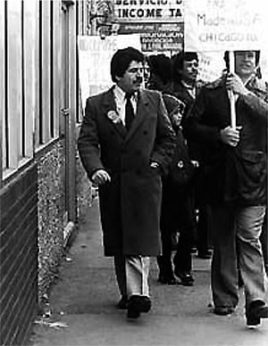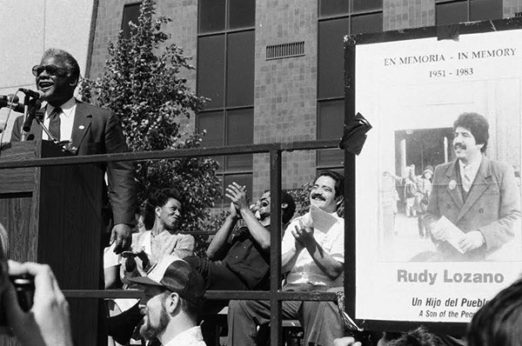On the morning of June 8, 1983, Rudy Lozano, chief Midwest field organizer of the International Ladies Garment Workers Union, was murdered in cold blood in his house in the Little Village neighborhood on Chicago’s southwest side. The forces behind his killing have never been conclusively identified.
 Rudy was one of the most important political figures in Chicago at that time, even though he was seldom seen on the evening television news or on the front pages of the big newspapers. This young Mexican American, born in Harlington, Texas, had grown up in Chicago and contributed much to the city’s progressive politics.
Rudy was one of the most important political figures in Chicago at that time, even though he was seldom seen on the evening television news or on the front pages of the big newspapers. This young Mexican American, born in Harlington, Texas, had grown up in Chicago and contributed much to the city’s progressive politics.
It was Rudy, more than anyone else, who united Chicago’s Mexican and Puerto Rican communities behind the campaign to elect Harold Washington mayor of Chicago in 1983. Washington won the election and became Chicago’s first African-American mayor and the most progressive mayor in the city’s history. Rudy himself, just a short time before, had fallen only seven votes short of entering a runoff election for a seat in the Chicago City Council. Had he won, he would have been the first Mexican-American alderman and one of the few not controlled by machine patronage politics.
Furthermore, Rudy was doing pioneering work in the effort to bring union recognition and justice on the job to immigrant workers, including the undocumented. He was an effective organizer of low-paid workers in the city’s tortilla factories, among other places.
Twenty years have passed since the tragic day of Rudy’s murder. Have we advanced in the causes for which Rudy Lozano fought and with which his name will always be identified?
We have to acknowledge that there have been many retreats, defeats, and disappointments, particularly in politics. Harold Washington died in office in 1987 and Chicago politics has generally taken a turn for the worse. On a national level, the Bush administration is even more ferociously reactionary than Ronald Reagan was in 1983 — something that Rudy would have probably found hard to believe. The Soviet Union and many other socialist countries are now capitalist backwaters. This would have distressed Rudy, who was an ardent fighter for socialism.
But there have been advances, too. There are now eight Latinos in the Chicago city council, seven in the Illinois House, and four in the Illinois Senate.
One thing stands out that would have made Rudy very happy: organized labor in the U.S., from local unions all over the country to the top leadership of the AFL-CIO, has now embraced the cause of the undocumented workers 100 percent. What at the time was a controversial, difficult position for Rudy to take has now become a major priority for labor.
Last year, Sin Fronteras, an organization in Chicago headed by Rudy’s sister Emma Lozano and modeled on his example, turned in 12,000 “Reward Work” cards in the campaign for immigrant legalization coordinated by the Service Employees International Union. This year, Sin Fronteras and any number of other organizations, churches, and unions are working even harder to support the “Freedom Ride” for immigrant rights that has been initiated by the Hotel Employees and Restaurant Employees Union.
As Emma Lozano points out, it was the diligent and patient work by Rudy and others like him within organized labor that made possible the historic move of the AFL-CIO Executive Committee in 2000 to make legalization of the undocumented a supreme objective of organized labor — an objective that will be won.
Rudy would also be happy that his parents, Guadalupe and Anita Lozano, his wife Lupe, his sons Rudy Jr., Pepe and David, his sister Emma and many more members of his family and of his old circle of friends and comrades have not let the torch go out. Rudy Lozano, Presente!













Comments